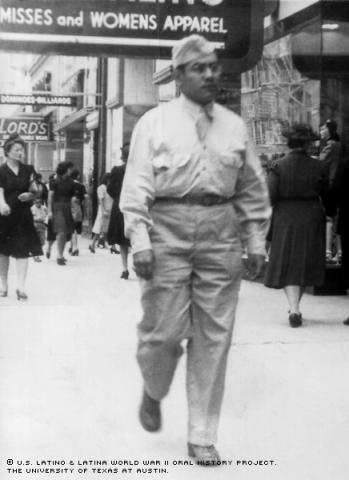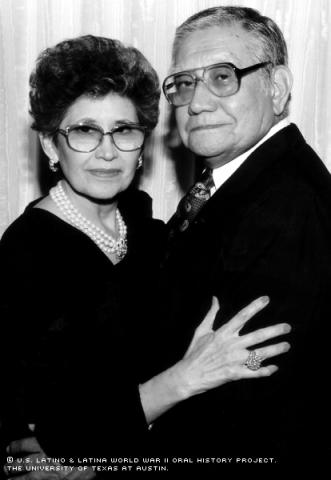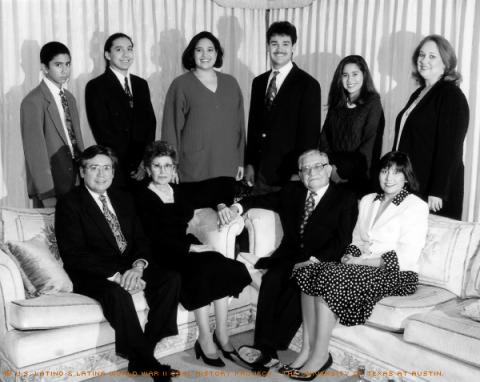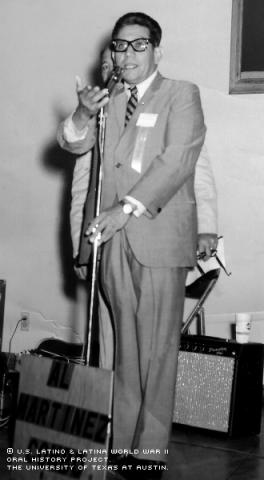



By Benjamin Smith
After serving his time in the Army and tasting equality in various parts of the country and world, Alfred J. Hernandez wanted nothing more than to leave the city he’d later change.
As a soldier, Hernandez had visited Virginia and New York, as well as Northern Africa and Europe, and says he liked being treated as an American. Back home in Houston, Texas, however, with its deep racial divisions, he was subjected to different treatment because of his ethnicity. He told his wife, Herminia Casas Hernandez, he no longer wished to live in Texas, but instead would like to either move up North or back to Mexico, where he was born.
"After discussing the way I felt with my wife, she soon convinced me we should stay in Houston and get involved and make an effort to fix the problems here," Hernandez said.
Hernandez took Herminia’s advice, getting a law degree that provided him with the credentials and tools to change hiring practices in Houston. In 1965, he also would become a national president of the League of United Latin American Citizens and, later, Houston's first Latino judge.
Hernandez was born August 23, 1917, in Mexico City. When he was 4, he and his family moved to Houston. Growing up, his family didn’t have a lot of money. His father, Jose Hernandez, was a watch-maker who worked for a large jewelry store before and during the war and later opened up his own shop, the Houston Watch Co. His mother, Josefina Guzman Hernandez, was a housewife.
"My father was unable to send us to college and said all he could do for us is teach us his trade of watch making," Hernandez said.
In the predominantly Anglo schools he attended, Hernandez says he was looked at as an oddity because of his Mexican origin. Despite that, he made it through his classes and graduated from Jefferson Davis High School in 1935.
After high school, he got a job as a disc jockey at radio station KLVL in Houston, where he played authentic Mexican music during his show. Hernandez was soon noticed and was hired to work at KATL, a bigger station where he worked as a disc jockey on the night shift. At this station, he played only English-language music, lost his Mexican accent and shortened his name to "Al." This was required for him to keep his job and attract a bigger, mainstream audience, he says.
The young man first saw his future wife while he was driving down the street and she was walking on the sidewalk. As he drove by, a gust of wind blew the young woman's skirt up and he noticed her shapely legs, he recalls with a chuckle.
"I soon found out who she was, made friends with her family and after five years of courting her, I married Herminia Casas on April 26, 1942," Hernandez said.
A little more than a year later, on August 13, 1943, 10 days before his 26th birthday, Hernandez was drafted by the Army and sent to Fort Sam Houston in San Antonio. From there, he was stationed in Aberdeen, Va., where he was trained to use firefighting instruments. Firefighting instruments involve setting up and fixing fire alarm systems. The Army chose to train him in this area because of his background in watch making and his ability to work with small instruments.
Once his training was complete, he was assigned to the 2615 Technical Supervision Regiment and stationed overseas in North Africa. There, he was able to learn French and Italian, which came in handy while he was overseas.
"I have a propensity for languages,'' Hernandez said, "and I picked up French and Italian very easily."
Hernandez, who by this time had earned the rank of Sergeant, attended a party for a French general in North Africa. At this party, he was able to engage the general in a conversation. Once the base commander noticed this and found out Hernandez also spoke Italian, he made him an interpreter for the Army.
Hernandez soon moved to different parts of Europe: Sicily, France and Germany.
One cold icicle-filled morning in Italy, Hernandez was instructed to put on his Class A uniform. He was among a group of soldiers sworn in as United States citizens by the Immigration and Naturalization Service. The Army made Hernandez a citizen because soldiers weren’t supposed to go overseas if they weren't U.S. citizens.
In France, the Army sent him to watch over some prisoners of war working at an oil refinery.
"I got along with the POWs very well, and by the time the war was almost over I got a chance to take them back to their countries," Hernandez said.
After the war, he was stationed in New York before being discharged on Feb. 3, 1946. He earned a EAME Campaign Medal with one Bronze Star, a Good Conduct Medal and a World War II Victory Medal.
He returned home to Herminia in Houston and also went back to school on the GI Bill; he first attended the University of Houston and then South Texas College of Law. He also became politically active, joining LULAC.
Hernandez played a part in getting Hispanics hired at jobs they hadn’t been able to get before by protesting to civil service agencies. He was responsible for the hiring of the first two Latino police officers in Houston, and he became the first Hispanic judge in Harris County since Texas was annexed by the Union in 1845.
He and Herminia had one son, Alfred Jr., and one daughter, Ana Marie.
Hernandez mentions some of his accomplishments but doesn’t gloat, for he feels that what he has done is still not enough.
"I wish I could have done more, and what I did accomplish was in all actuality not that much for the Hispanic movement," he said.
"I didn't open doors,'' Hernandez said. "I was just part of the movement."
Mr. Hernandez was interviewed in Houston, Texas, on October 24, 2002, by Ernest Eguia.

